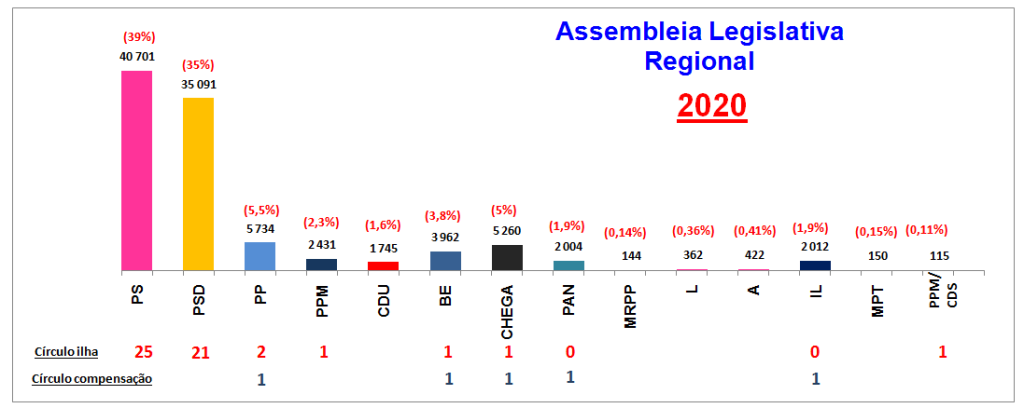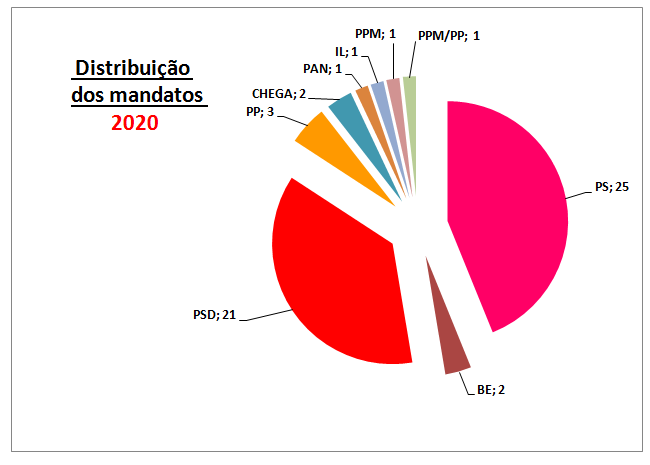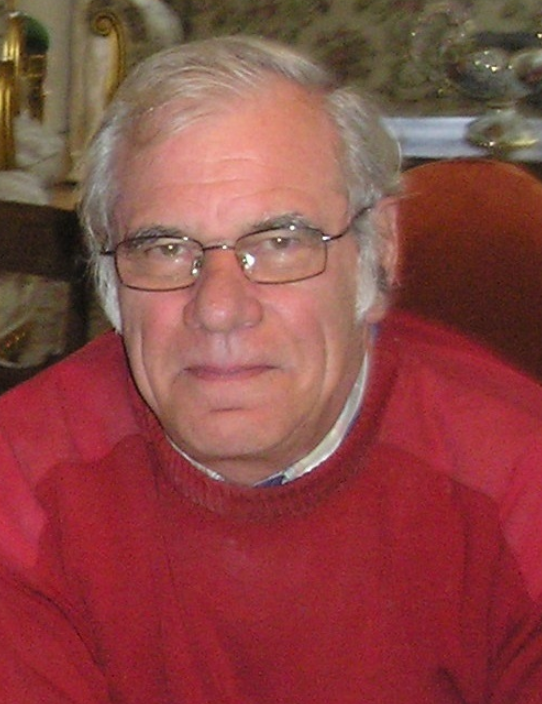Artigo sobre eleições publicado na Universidade de Fresno, na Califórnia.
O artigo que saiu no "Diário Insular" com o título "O que pode mudar nas eleições de 4 de Fevereiro" foi publicado nos EUA numa boletim informativo da Universidade de Fesno, coordenado por Diniz Borges, com informação sobre os Açores, destinada a pessoas de segundas e terceiras gerações, que já não falam português mas gostam de acompanhar o que se passa na terra de seus pais e avós.
1 AZORES CONNECTION - LIGAÇÕES AOS AÇORES, EVENTS-EVENTOS, INFORMATION--INFORMAÇÕES, NEWS-NOTÍCIAS
Elections in the Azores: What could change on February 4, 2024

The graph above shows the results of the elections in 2020. As you may recall, there wasn’t much of a door-to-dorr campaign because of the pandemic
At a time when regional elections are being held, it makes sense to review the last election’s results, at least to refresh our memories. The circumstances that marked the holding of this election are, in many ways, strange and may have influenced the results.
Perhaps the most certain element is that abstention, which had already fallen in 2020, may even lower given the more intense and exciting debate expected in the face of the doubts that have arisen. Rarely has an election attracted so much attention in the Azores. Much more than expected. From the circumstances that brought down the government to how the elections were scheduled and the issues that have been discussed in the corridors of power to the broader public debate. Circumstances that, in the opinion of many, will make the political picture different. Most people want a more stable government to emerge, one that is not at the mercy of quasi-personal discretion.
What the last elections show us
Looking at the graph of the 2020 results, you can see that the PS won the elections, but because of what happened nationwide, the PSD found partners to ensure the formation of a government. With a minimal difference. At the time, it was said that this was an unsound solution and, above all, one that made no ideological sense.
That solution ended up lasting longer than many predicted. Bolieiro’s government managed to survive and gain a good image in many sectors, mainly because of its attitude towards people.

The graph above shows the number of seats in the Azorean Parliament from the prior elections in 2020
Doubts over the fall of the government
Without an obvious explanation, the parties stopped supporting the government, rejecting the 2024 plan with the message that they would not approve any other documents. An unclear position since it had nothing to do with the content of the proposals (which was what was actually at stake). Based on this information, in consultation with the Council of State, the President of the Republic decided to dissolve parliament and call elections, leaving many questions unanswered.
Naturally, this decision will be part of the debate and perhaps influence the electorate’s opinion. The same can be said about who was responsible for provoking these elections. Many have already said this, and Álvaro Dâmaso recalled it in a text published in Diário Insular: “The parties that bring down a government lose the following elections, so the experience goes, at least ours.”
What’s new
Contrary to what happens at a national level, where several polls have been published, there are no opinion polls in the Azores, at least not known ones. Of course, national polls have no validity in the regional context. Even on several occasions, the results in the Azores differed from the elections in the country as a whole, even when the dates were near each other.
What is new in the Azores that could influence the results? The PSD; CDS/PP, and PPM are now presenting themselves in a coalition, a phenomenon about which there are doubts as to the effects it will have on the electorate; the PS is presenting itself without innovations; CHEGA is no longer “taboo” and today people are openly commenting on what they think and also, if appropriate, assuming without fear who they will vote for; there will likely be a more active debate and a more intense campaign in the streets, which could reduce abstention and influence the results; in informal conversations, there is little discontent among farmers (a sector that has a considerable weight in the electorate), but within the civil service, there is displeasure, the reasons for which are not very clear; tourism will be very much in the debate, especially the options regarding air operations.
But perhaps what will carry the most weight is stability. Generally speaking, people don’t understand the need for this election, so they will weigh up very carefully which side is best placed to lead to stable governance.

Rafael Cota is a well-known, respected journalist in Terceira island, and this piece was for the newspaper Diário Insular, José Lourenço-director.

